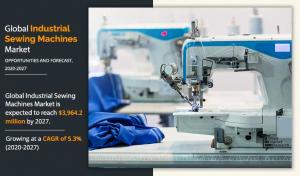Industrial Sewing Machines Market Top Vendors and Future Insights | $3,964.2 Mn Forecast by 2027
The industrial sewing machines market is growing at a CAGR of 5.3% from 2020 to 2027
PORTLAND, OREGON, UNITED STATES, November 15, 2023 /EINPresswire.com/ -- The global industrial sewing machines market size is expected to account for $3,964.2 million in 2027 from $3,163.4 million in 2019, growing at a CAGR of 5.3% from 2020 to 2027
Industrial sewing machines are specially designed for large-scale stitching applications of apparel and non-apparel products. They are utilized for production of apparel such as shirts, t-shirts, and jeans as well as non-apparels, including bags, parachutes, shoes, tarpaulins, and tents. Industrial sewing machines exhibit highly powerful motors, which enable operation for long hours. Moreover, industrial sewing machines are available in various types depending upon the operations they perform, including lockstitch, chainstitch, zigzag stitch, and other industrial sewing machines.
Request for Sample Report (Get Full Insights in 220 PDF Pages) @ https://www.alliedmarketresearch.com/request-sample/6999
Top Leading Companies: Mitsubishi Electric Corporation, BERNINA International AG, Brother Industries, Ltd, Pegasus Sewing Machine Mfg. Co., Ltd., Yamato Sewing Machine Mfg. Co., Ltd., AMF Reece CR, s.r.o., Juki Corporation, Dürkopp Adler AG, Jack Sewing Machine Co. Ltd., Seiko Sewing Machine Co., Ltd.
In addition, they can be categorized based on the type of bed on which the fabric is stitched. This includes a flat bed, cylinder bed, post bed, and long arm bed. the industrial sewing machines. As the demand for textiles continues to surge, the industrial sewing machines market has become a pivotal player in shaping the industry's landscape. This blog aims to unravel the intricate threads of the industrial sewing machines market, exploring its current state, key trends, and future prospects.
The global industrial sewing machines market is segmented into application, bed type, fabric weight, and region. The applications covered in the study include apparel and non-apparels. According to bed type, the global market is categorized into flat bed, cylinder bed, and post bed sewing machines. By fabric weight, the market is classified into light weight, medium weight, heavy weight, and extra-heavy weight sewing machines.
Industrial sewing machines are increasingly being integrated into smart manufacturing environments as part of the industry 4.0 revolution. Automation and connectivity technologies are enhancing efficiency, reducing labor costs, and improving overall production quality. The growing emphasis on sustainability in the textile industry is influencing the industrial sewing machines market. Manufacturers are developing machines that contribute to reduced waste, energy efficiency, and the use of eco-friendly materials, aligning with the global push for sustainable practices.
Buy This Research Report @ https://www.alliedmarketresearch.com/checkout-final/e6e740c96c41a2dad905bfc687fdc35c
The industrial sewing machines market is at the crossroads of tradition and innovation. As technology continues to weave its way into every aspect of production, industry must adapt to meet the evolving demands of a dynamic market. By staying nimble, embracing sustainability, and investing in the future of automation, the industrial sewing machines market is poised to stitch the fabric of progress for years to come.
The industrial sewing machines market is poised for continued growth, driven by technological innovations, increasing demand for customized products, and a focus on sustainable manufacturing practices. As the industry evolves, collaboration between manufacturers, increased investment in research and development, and efforts to address challenges related to cost and skilled labor will play pivotal roles in shaping its future.
The industrial sewing machines market is witnessing a transformative phase, marked by a convergence of technology, sustainability, and efficiency. Industry players must adapt to these changes to stay competitive and contribute to the evolution of manufacturing processes on a global scale. The industrial sewing machines market, like many others, has been impacted by global supply chain disruptions. Factors such as raw material shortages, transportation issues, and geopolitical tensions can influence the availability and cost of sewing machine components.
Enquiry Before Buying @ https://www.alliedmarketresearch.com/purchase-enquiry/6999
David Correa
Allied Analytics LLP
+ + +1 800-792-5285
email us here
Visit us on social media:
Facebook
Twitter
LinkedIn
Legal Disclaimer:
EIN Presswire provides this news content "as is" without warranty of any kind. We do not accept any responsibility or liability for the accuracy, content, images, videos, licenses, completeness, legality, or reliability of the information contained in this article. If you have any complaints or copyright issues related to this article, kindly contact the author above.

